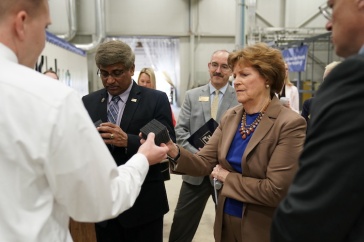
When Gerry Donahue ’22 toured UNH’s InterOperability Lab (IOL) during a visit to campus as a prospective student a few years ago, the New Hampshire resident’s sense of geography failed him momentarily.
“I was thinking, ‘wow, it seems like I’m in Silicon Valley,’” Donahue, now a sophomore, says.
The lab, on the edge of campus in downtown Durham, can indeed give off Silicon Valley vibes. That’s thanks to the titans of the data communications industry that routinely come to the UNH facility to test their products — partners that have included Apple, Google, Microsoft, Dell, Cisco and Nokia.
But the lab can also be a direct pathway to Silicon Valley itself — and plenty of other global employment hotbeds — for the more than 100 students who make up its workforce at any given time.
“I have found the students I work with there to be incredibly bright,” says Thomas Lewis, Power over Ethernet (PoE) applications and marketing manager at Texas Instruments. “They bring into every interaction a level of excitement you just don’t get working with a standard test house. It’s a phenomenal asset to the community and UNH.” Texas Instruments, which has a design center in Manchester, most recently worked closely with the IOL on the IEEE 802.3bt PoE standard and Ethernet Alliance GEN2 test suite.
IOL director Jeff Lapak ’04, ’13G describes the lab as a third-party test house that helps companies bring products to market faster while making sure those products work well together. The lab provides a neutral space for companies to test their products against each other in order to confirm compatibility in the real world — read, interoperability — and also focuses heavily on conformance, helping ensure that corporations are meeting critical industry specifications and standards.
The lab isn’t ostentatious — it’s replete with bundles of blue-and-white wires hanging from the ceiling, computer monitors with illuminated scrolling green text and racks of tiny metal and electrical parts strewn throughout the space. But the test work taking place there has a significant impact on the data communications industry worldwide.
Companies come from around the world to test their products at the IOL, massive international companies that are otherwise “trying to go head-to-head with each other and win the market,” Lapak says. The IOL worked directly with 183 companies last year.
The lab is the only one of its kind in the country. It is entirely industry-funded, so it costs the university nothing, and it handles a wide range of technologies, a significant advantage over most test houses that specialize in one area.
It also grew organically, from humble beginnings. In 1988, UNH’s Research Computing Center (RCC) was testing data equipment from a pair of vendors — one of which was Prime Computing — that it discovered was not interoperable. The RCC brought the vendors together and brokered a solution. And that’s when the lightbulb went off for founders William Lenharth ’69, ’74G, ’78G and Barry Reinhold ’81, ’88G.
“Prime said, ‘you fixed it for us and saved us a lot of money; can you do it again?’ We took that concept and we just keep adding technologies and companies to it,” Lapak says. “We got lucky in that 30 years ago, the [UNH] administration saw this as beneficial to students on the career side.”
Through all the growth and success, the IOL’s focus has remained steadfastly on the students. And though about 80% of the 100-plus student workforce is made up of engineering and computer science majors, the other 20% come from all majors across the university.

Students perform the vast majority of the testing work done in the lab, which allows them to interface directly with recognizable global brands on a regular basis, opening the door for employment opportunities virtually the moment they receive their diploma.
“You’ll get a job. It’s all but guaranteed as a student if you want to go into the field,” says Lapak, who noted that the lab has a “99.9%” job placement rate. “A big part of that is they’ve been working with companies for three or four years, so I usually don’t even need to help make connections for the students — they have a network of people they’ve worked with who want them to come work for them.”
Donahue, now a computer science major, was so impressed with his initial tour that, once admitted, he began working at the IOL the week after he graduated from high school. He has secured an internship with Intel in California this summer.
“I think the best part about the lab is the experience you get,” says Donahue. “You’re testing devices, you’re learning protocol, you’re going through training — it’s real-world experience, and it also works alongside what you’re learning in the classroom.”
Hannah Dukeman, a senior information technology major, has no shortage of post-UNH options, thanks in large part to her work with the lab.
“It’s nice to be able to get your name out there, because you’re constantly talking with companies,” says Dukeman. “I have people who are reaching out and saying, ‘we’ve worked with you for years, what are you planning on doing?’ It’s an awesome experience, and I really do feel like I have a leg up.”

-
Written By:
Keith Testa | UNH School of Law | keith.testa@law.unh.edu | 603-513-2016


















































